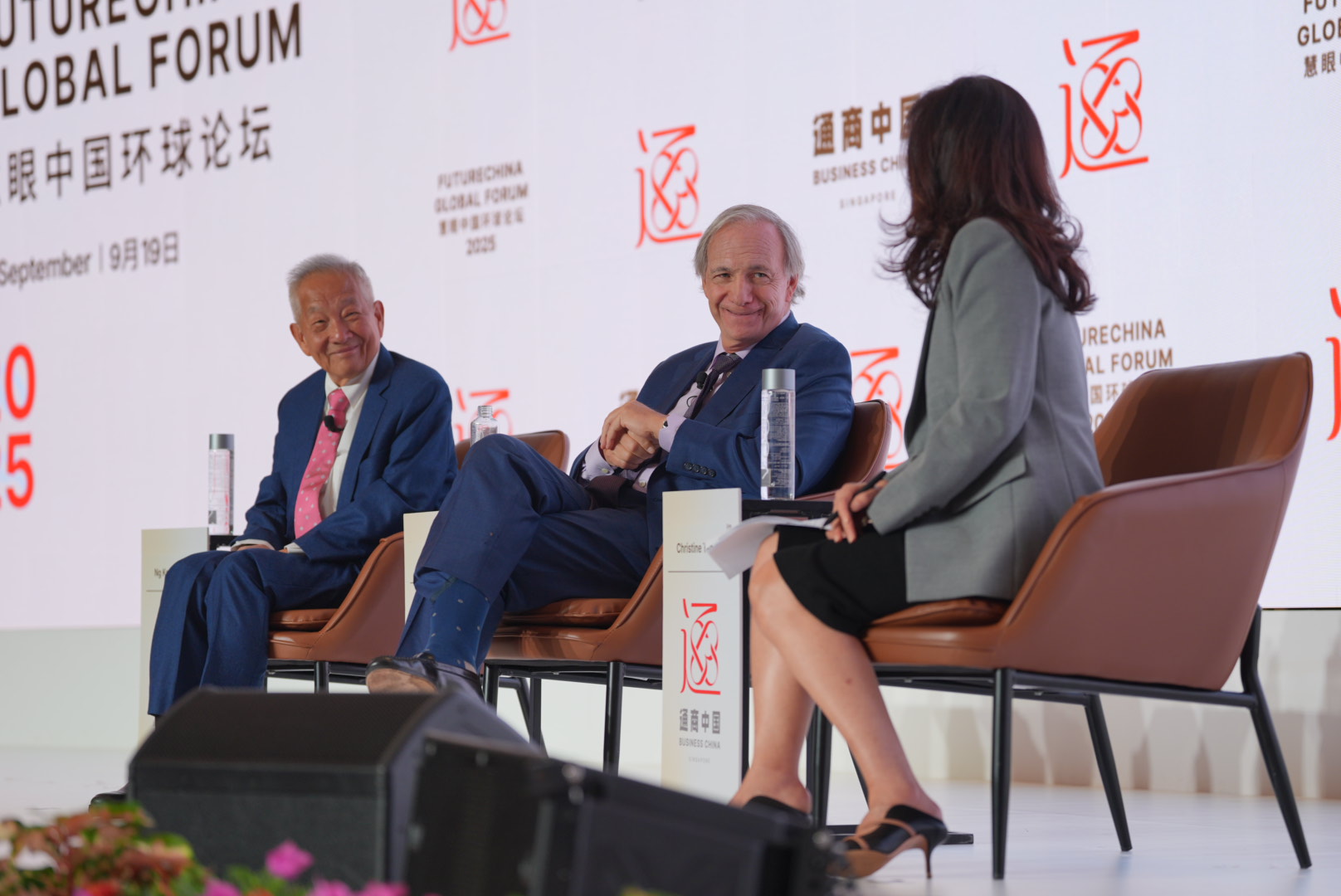FutureChina Global Forum 2025
The World in Flux – Challenges and Opportunities
In Conversation: Ray Dalio and Ng Kok Song
Executive Summary
Founder of Bridgewater Associates, Ray Dalio and Founding Partner & Chairman of Avanda Investment Management, Ng Kok Song discussed the current global economic landscape, drawing strong parallels to historical cycles of rising debt and the decline of dominant empires, particularly the 1970s. Dalio outlined the unsustainable US debt situation, driven by overspending and political inability to implement fiscal discipline, warning it threatens the US dollar’s status. Ng Kok Song recounted Singapore’s prudent diversification from the British Pound to the US Dollar and gold in the 1970s as a lesson in managing sovereign wealth amidst global shifts. Both agreed that the dollar’s role as a storehold of wealth is diminishing, advocating for investors to diversify into real assets like gold. They concluded that while the US faces a “tipping point,” a complete collapse is not imminent, but investors and nations must adapt to a changing world order by prioritising fiscal prudence, diversification, and understanding currency debasement.
- The Inevitable Repetition of Historical Economic Cycles
The discussion highlights that current global economic conditions are not unprecedented but are part of long-term, predictable cycles of debt, empire decline, and currency debasement that have occurred throughout history.
- Ray Dalio compares the 1971 de-pegging of the dollar from gold to a similar event in 1933, showing that printing money to manage debt is a recurring theme.
- Ng Kok Song identifies the 1970s as a period marking both the decline of the British Empire and the beginning of the US economy’s own long-term decline.
- Dalio explains his model of history showing that empires typically rise and fall in cycles lasting approximately 250 years, with the world now in a period of transition.
- He emphasises that “history rhymes” because the same cause-and-effect relationships repeat, and studying them is crucial to understanding the future.
- The Unsustainable US Debt and Fiscal Crisis
The panel detailed the severe fiscal imbalance in the United States, where massive overspending, rising debt service costs, and political gridlock have created an unsustainable financial situation.
- The US is spending $7 trillion while only taking in $5 trillion, resulting in a $2 trillion annual deficit.
- Annually, the US must sell approximately $12 trillion in debt to finance its new deficit, cover interest payments, and roll over maturing debt.
- This debt burden was manageable when interest rates were near zero but becomes a critical problem at current rates of around 4%.
- Ray Dalio argues a political solution is nearly impossible, as politicians from both parties have pledged not to raise taxes or cut benefits, which are the necessary actions to stabilise the debt.
- The Waning Dominance of the US Dollar and Rise of Alternatives
The speakers argue that the US dollar’s long-standing role as the world’s primary reserve currency is being threatened by the country’s fiscal problems and the debasement of fiat currencies globally, leading to a flight towards real assets.
- While the dollar will likely remain an important medium of exchange, its role as a reliable “storehold of wealth” is being seriously questioned.
- Ng Kok Song recalled Singapore’s prudent decision in the 1970s to diversify its reserves by converting some US dollars into gold, highlighting an early sign of this trend.
- Due to its recent price appreciation, gold has effectively become the second-largest reserve asset held by central banks, surpassing the Euro in market value.
- All fiat currencies, not just the dollar, are at risk of debasement, making non-sovereign assets like gold an “ultimate hedge” during times of crisis.
- Investment Strategies for a Changing World Order
In light of these global shifts, the panel offered clear advice for investors, emphasising diversification, risk management, and a focus on real returns to protect wealth.
- The single most important principle for investors is to diversify well across different asset classes and geographies rather than making concentrated bets.
- Investors must differentiate between an asset’s performance and its currency exposure, which can and should be managed separately.
- Real assets, such as gold, should form a significant part of a portfolio to act as insurance against currency debasement and geopolitical turmoil.
- Equities can offer a degree of protection against inflation and currency debasement, as demonstrated by the stock market rising even after the 1971 Nixon shock.

